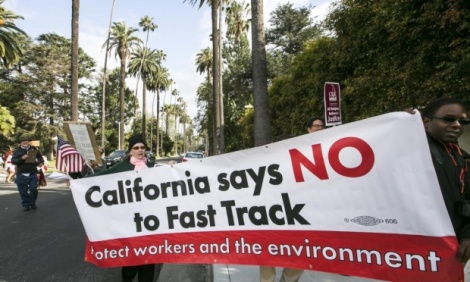(The Guardian) The US Congress could soon pass legislation to fast-track the Trans-Pacific Partnership (TPP), which may result in the 12-nation trade deal being passed within a fortnight. President Barack Obama needs the Trade Promotion Authority to fast-track trade talks between TPP nations, which account for nearly 40% of the global economy. Australia is one of those nations. Trade Promotion Authority would give the president the power to negotiate an agreement that Congress would then be able to approve or block, but not amend. In a surprising development, the president has the support of his Republican opponents in granting the authority, but faces opposition from Democrats. A procedural vote on the Trade Promotion Authority was narrowly blocked in the Senate by Democrats last week, despite Obama making it one the centrepieces of his presidency. Read more here.
- Comment
- Reblog
-
Subscribe
Subscribed
Already have a WordPress.com account? Log in now.

I find it very interesting how many organizations/obligations that U.S. diplomats have embarked upon that end up failing because of lack of support in the Legislature. Understandably this is to avoid false representation or rash decisions made by over zealous diplomats. However, given the fact that the U.S. often makes agreements that are not supported, it is interesting that countries are not more skeptical. In similar situations we have discussed regarding the Kyoto Protocol, the lack of U.S. commitment has negatively affected progress. Being such a powerful country, our lack of involvement sets a precedent for other countries which follow suit and results in no commitment from anyone. I think reducing the time in which the legislative approval process works, would result in much timelier responses and potentially the over looking of smaller party politic based disagreements in favor of approving the initiatives in order to begin taking steps towards alleviating problems. All in all, this is a very interesting concept
LikeLike
Interested to see how this develops. I was listening to NPR earlier and it said the TPP was catching flack from the GOP as well now…
I’m nervous that the recent recession will have inspired protectionist sentiments. When NAFTA passed in 1994, we had to sacrifice a few key industries to countries who were just more efficient and more capable in the production (ie wool suits with Canada), but NAFTA was passed when our GDP growth rate was around 4% whereas we’re at a tumultuous 2%. I think increased trade could only improve that, but I’m not policy-makers will have as much faith, or worse yet, they will have faith but still reject the TPP in order to appease constituents.
LikeLike
*I’m not sure policy-makers
LikeLike
This article was really intriguing to me, but left me curious for more elusive details about the TPP. I agree with the point Bailey Marie made, the United States’ involvement in agreements such as these is critical. I looked into the Trans-Pacific Partnership, and this article clarified a lot for me: https://www.eff.org/issues/tpp
LikeLike